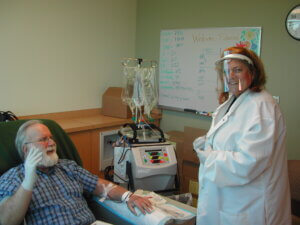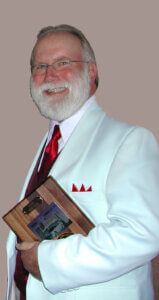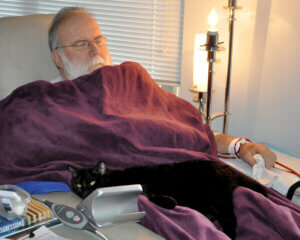Chris Gray shares her husband Ed’s experience on home dialysis:
Being inquisitive comes with the territory when you’re a librarian, and by all accounts Ed Gray was inquisitive. He was someone who loved to read and learn and loved helping others experience that joy of discovery.
When Ed passed away in 2013, he was well-known for encouraging people, not just students, to read at least 30 minutes a day. He would readily admit to enjoying the occasional trash novel when asked what he was reading. It didn’t always matter what you read, what was important was the act of reading, he would say.
When Ed and his wife Chris met, they had full lives and well-established careers in education. Ed was the librarian in a junior high school in Northshore School District (Bothell and Woodinville) and Chris was an occupational therapist working with special needs children in the Lake Washington School District (Kirkland and Redmond). They shared a commitment to others, a sense of humor, a love of travel and a positive attitude. Unfortunately, kidney disease would also be something they would share.
Out of the blue
One weekday afternoon in 2005 after both had retired, Ed told Chris he didn’t feel well and asked her to take him to the emergency room. When they arrived at Evergreen Hospital, Ed was immediately admitted, although the doctors didn’t know what was going on. It was the beginning of 17 days in the ICU with Ed in a coma and breathing with the help of a ventilator. He experienced multiple system failure including failure of his kidneys.
As he recovered, he was told he would need dialysis. As happens with many people, Ed did not experience any symptoms until advanced kidney disease made itself known during this hospital stay.
Ed was ever appreciative of the dialysis treatments and would tell others that “dialysis has given me years of life I otherwise wouldn’t have had.” Chris knew, however, how hard the in-center treatments were on Ed, physically. She says Ed would be so exhausted after treatments that he couldn’t safely drive himself home and it would take hours before he would feel normal.

Enter Home dialysis
After a couple of years of in-center dialysis, Ed heard about presentation on home dialysis, and he wanted to learn more. He asked Chris if she would come to a presentation on Northwest Kidney Centers’ home dialysis program, and they went together.
They learned that dialyzing at home gives people more flexibility and independence. The home dialysis regimen more closely matches the work done by functioning kidneys with its 5 days per week dialysis rather than 3.
After the presentation, they agreed that home dialysis was the best path for them. They began training with clinical staff at Northwest Kidney Centers, and in weeks, Chris became Ed’s official home dialysis caregiver.
Chris saw the difference at their first training session. After completing a training treatment, Ed clearly looked and felt better. He took the car keys from Chris and said, “I can drive home.”
Game changer
Home dialysis made the situation for Ed and Chris about as good as it could be. Ed’s quality of life was given a serious, positive boost. In addition to the added comfort of being in one’s own environment, the five times per week home treatments did not leave Ed fatigued or in discomfort.
“Our dialysis experience became so much better,” said Chris. “Treatments at home were so much easier on Ed.” The added flexibility and control allowed Ed and Chris to change schedules if needed. Travel by car or plane with the equipment was also possible. They did his dialysis in homes of family and friends and even hotels. Ed could also dialyze for longer periods or on consecutive days if he wanted.
The flexibility also made traveling much easier. They could take Ed’s home machine with them and take or have sent supplies in advance. Their adventures included trips to several in the southwest by car or plane, including several classic car shows.

Chris and Ed and nine of their friends had taken a river cruise down the Rhine River in Europe in 2002. After he needed dialysis, he did explore whether they could travel out of the country with their home dialysis equipment. At that time it considered very risky to do. He told Chris that one of his biggest regrets was not getting back to Europe.
Poster boy for home dialysis
Ed wanted to share his profound home dialysis experience with other patients. He wanted them to know that while home dialysis may not be for everyone, it was an excellent option for many. True to his professional calling, he began helping others discover the ins and outs of home dialysis so they could make informed and thoughtful decisions about their own course of treatment.
 When NKC had a patient who was interested in home dialysis they would call Ed. He would invite these prospective home patients to their home to see their setup and talk about procedures they used. And always the consummate librarian, Ed was ready to answer or to help find an answer to any questions they might have.
When NKC had a patient who was interested in home dialysis they would call Ed. He would invite these prospective home patients to their home to see their setup and talk about procedures they used. And always the consummate librarian, Ed was ready to answer or to help find an answer to any questions they might have.
Ed is no longer around to share his home dialysis experience, but we hope his story helps patients explore available treatment options and pursue their goals of living their lives most fully.
To learn more about home dialysis, please visit https://www.nwkidney.org/living-with-kidney-disease/dialysis-at-home/.
